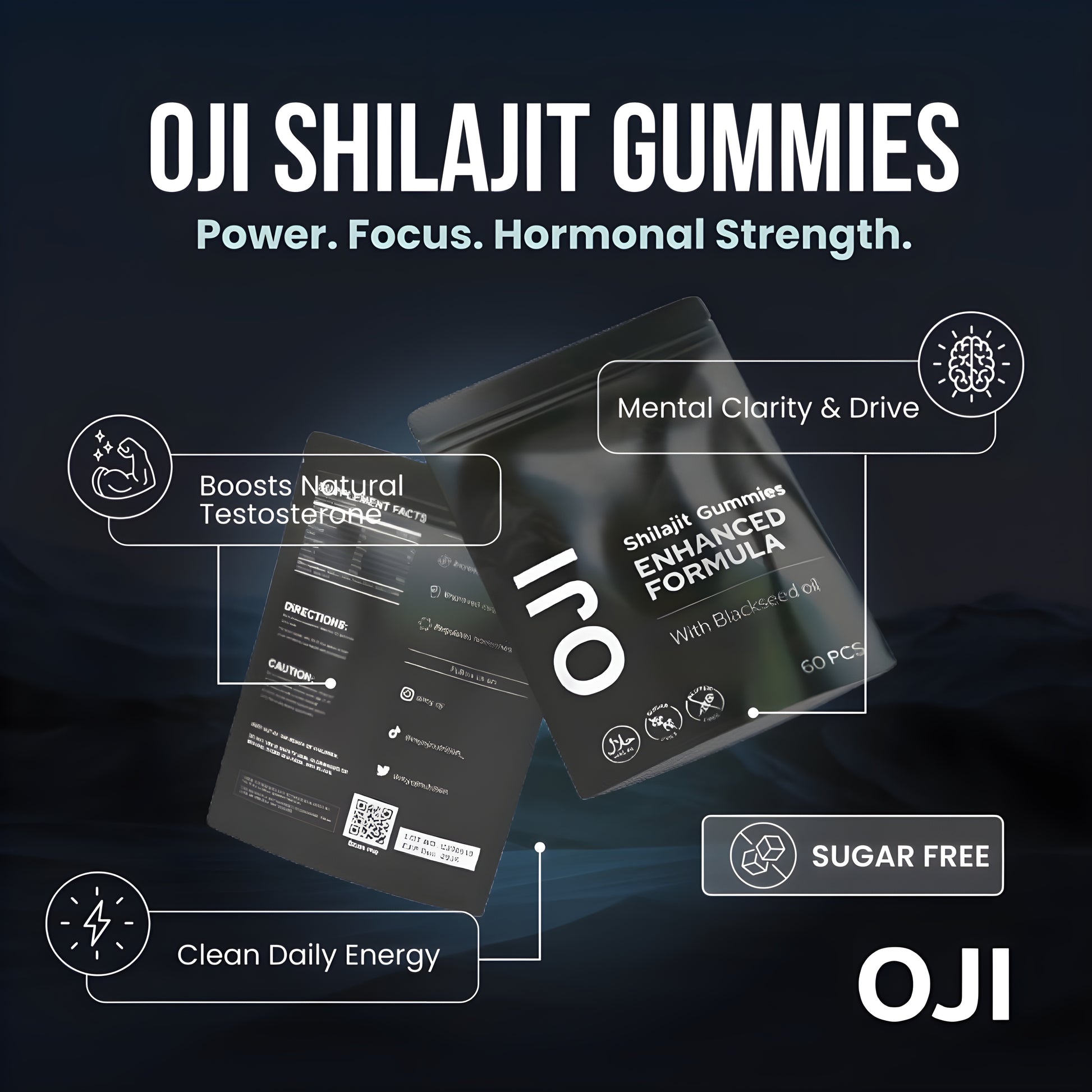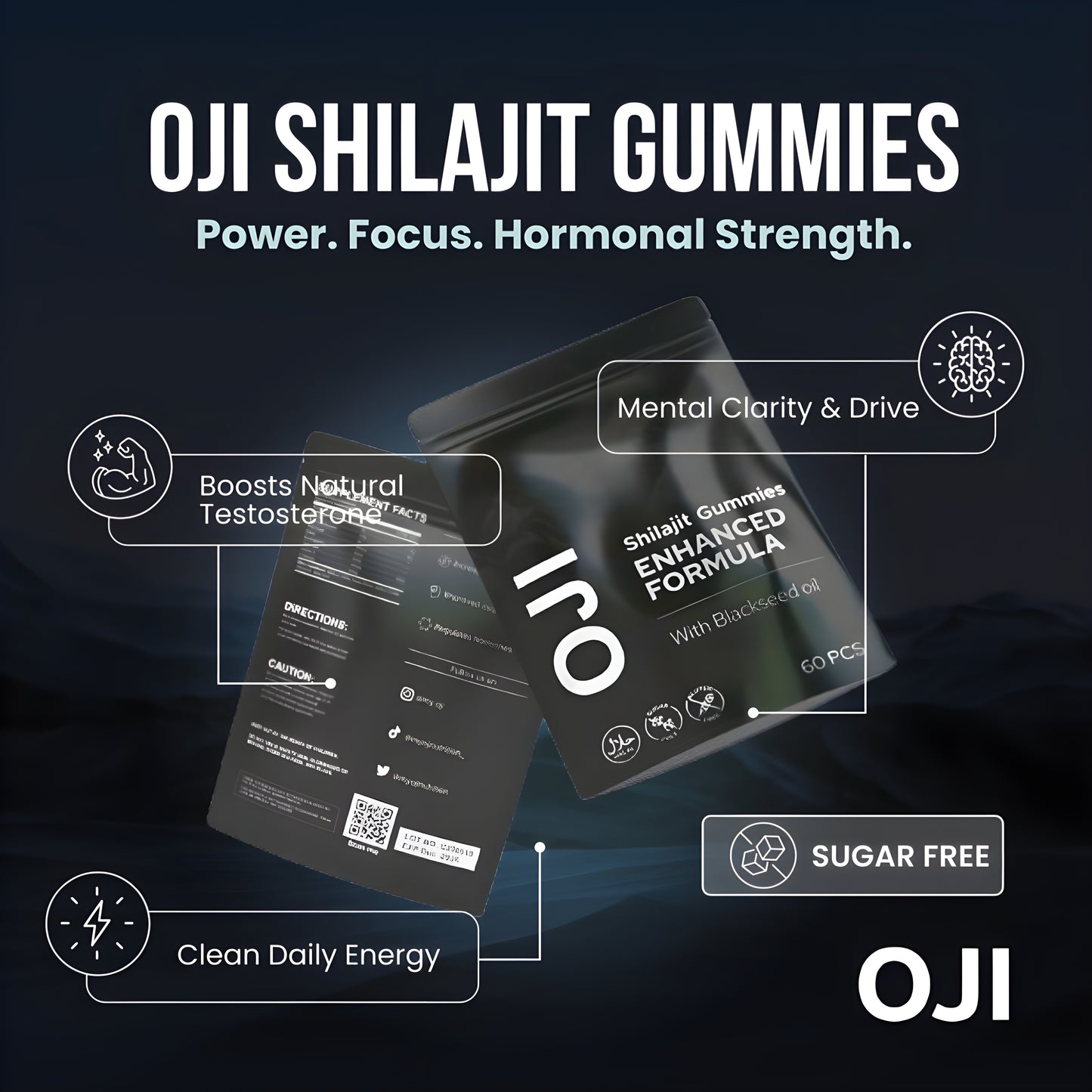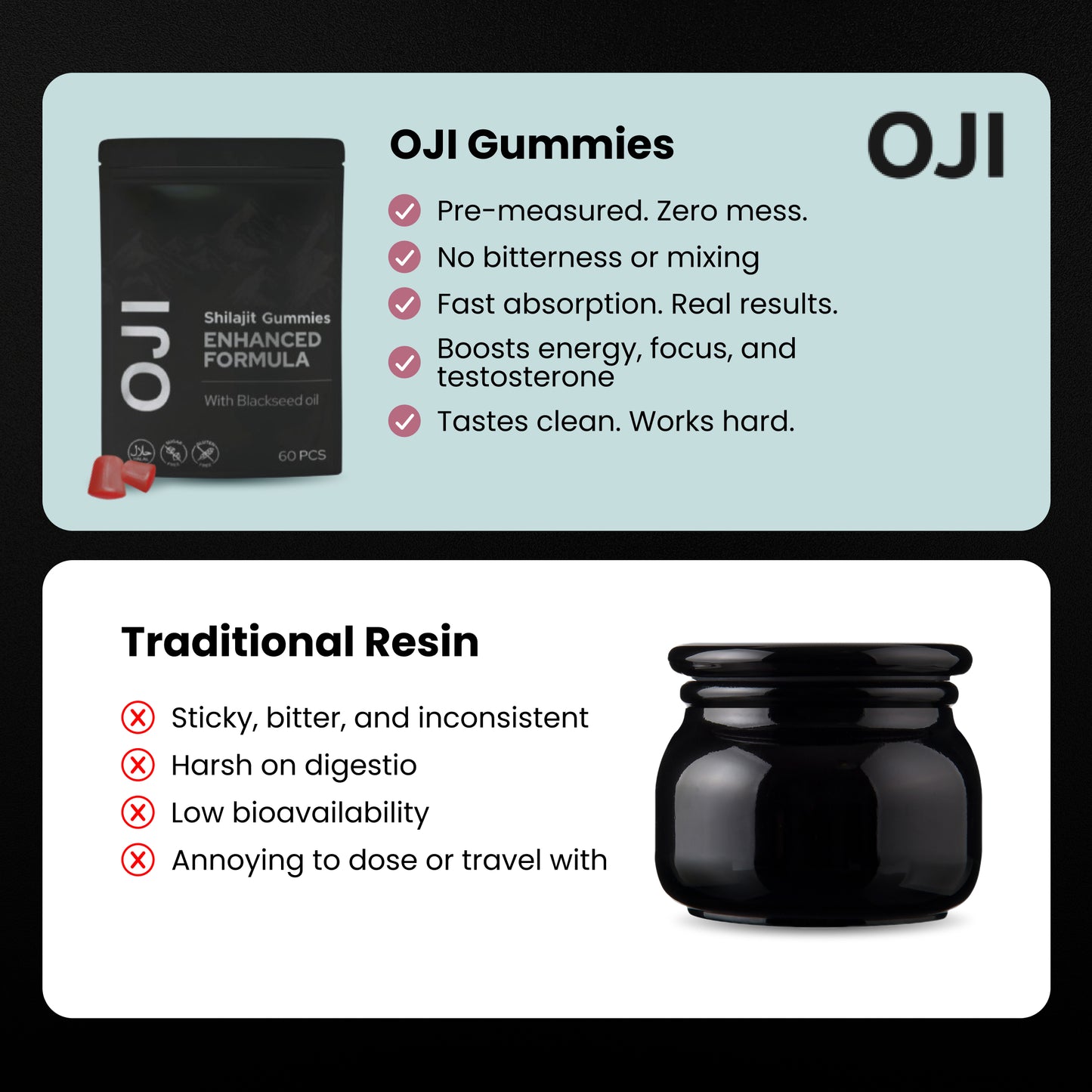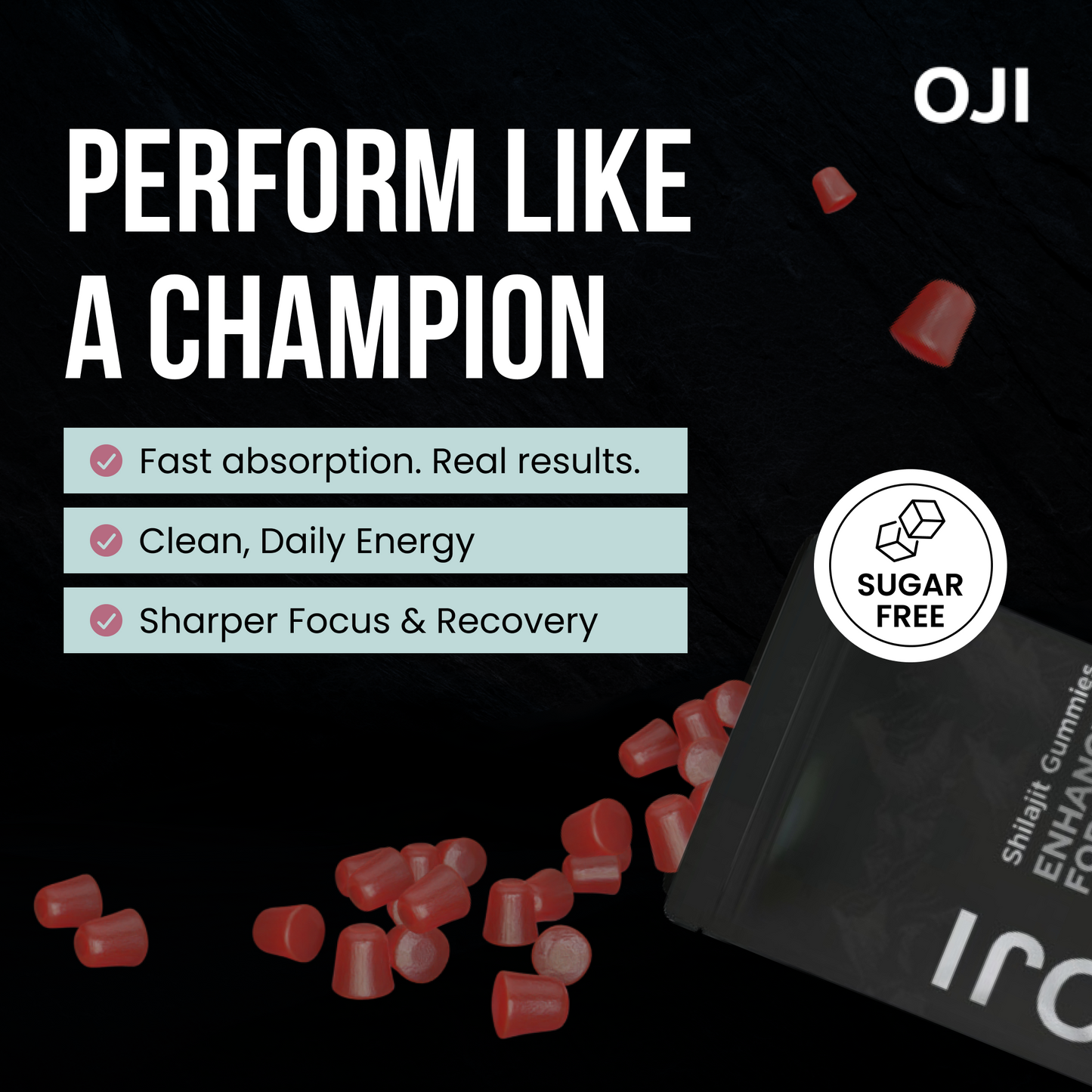Brain fog isn't just a fleeting moment of confusion; it's a persistent haze that can cloud your thoughts, dull your focus, and drain your mental energy. This cognitive fatigue often stems from chronic stress, poor sleep, nutritional gaps, and the relentless demands of a fast-paced life. While it can feel frustratingly debilitating, the good news is that reclaiming your mental clarity is entirely achievable through targeted, natural approaches.
This guide moves beyond generic advice to provide a comprehensive toolkit of powerful, science-backed natural remedies for brain fog. We will explore a range of actionable strategies you can implement immediately to sharpen your cognitive function. You will discover how specific foods, potent supplements, and foundational lifestyle adjustments work together to dispel mental clutter and enhance focus.
Throughout this listicle, we will detail the benefits and practical applications of key nutrients and herbs, including:
- Essential Omega-3 Fatty Acids
- Cognition-enhancing Lion's Mane Mushroom
- Adaptogens like Bacopa Monnieri and Rhodiola Rosea
- Critical minerals and vitamins such as Magnesium and B-Complex
We will also touch upon how innovative formulations, which may incorporate ancient ingredients like Shilajit into convenient modern forms, can support a holistic strategy for brain health. Each item is presented with clear, practical steps to help you integrate these solutions into your daily routine. Prepare to cut through the haze and rediscover your sharpest, most resilient self.
1. Boost Your Brain with Omega-3 Fatty Acids
When searching for natural remedies for brain fog, starting with the fundamental building blocks of your brain is a powerful first step. Omega-3 fatty acids, particularly eicosapentaenoic acid (EPA) and docosahexaenoic acid (DHA), are essential fats that form the very structure of your brain cell membranes. Think of them as the high-quality materials needed to construct a resilient and efficient neural network.
These fatty acids are crucial for facilitating swift communication between neurons and possess potent anti-inflammatory properties. This is vital because a key contributor to brain fog is neuroinflammation, a low-grade, chronic inflammatory state in the brain that can disrupt cognitive processes. By ensuring a robust intake of omega-3s, you are actively combating this inflammation, helping to clear the mental haze and supporting long-term cognitive health.
Why Omega-3s Are a Top-Tier Remedy
The impact of omega-3s on cognitive function isn't just theoretical; it's backed by significant scientific evidence. For instance, populations that consume a Mediterranean-style diet, rich in oily fish, consistently show lower rates of age-related cognitive decline. Furthermore, numerous clinical trials have demonstrated that supplementing with EPA and DHA can improve memory, focus, and overall cognitive performance in adults.
Expert Insight: Leading figures in integrative medicine, such as Dr. Andrew Weil, have long championed the role of omega-3s in maintaining brain health, highlighting their importance not just for treating deficits but for optimising cognitive function throughout life.
Practical Steps for Implementation
Incorporating omega-3s into your daily routine is straightforward. The primary goal is to ensure you are getting a therapeutic dose of both EPA and DHA.
- Target Dosage: Aim for a combined intake of 1000–2000 mg of EPA and DHA daily. Check supplement labels carefully, as the total "fish oil" amount is different from the specific EPA/DHA content.
- Best Food Sources: Increase your consumption of cold-water fatty fish like salmon, mackerel, herring, and sardines. Aim for at least two servings per week.
- Supplement Wisely: If you don't eat fish regularly, a high-quality supplement is an excellent alternative. Always take it with a meal containing some fat to enhance absorption.
- Vegetarian/Vegan Options: For those on a plant-based diet, algae-based supplements are a superb source of pre-formed EPA and DHA, offering a direct route to these brain-boosting nutrients without relying on fish.
For a quick reference on the primary benefits, the following summary box visualises the key takeaways of integrating omega-3s into your wellness plan.
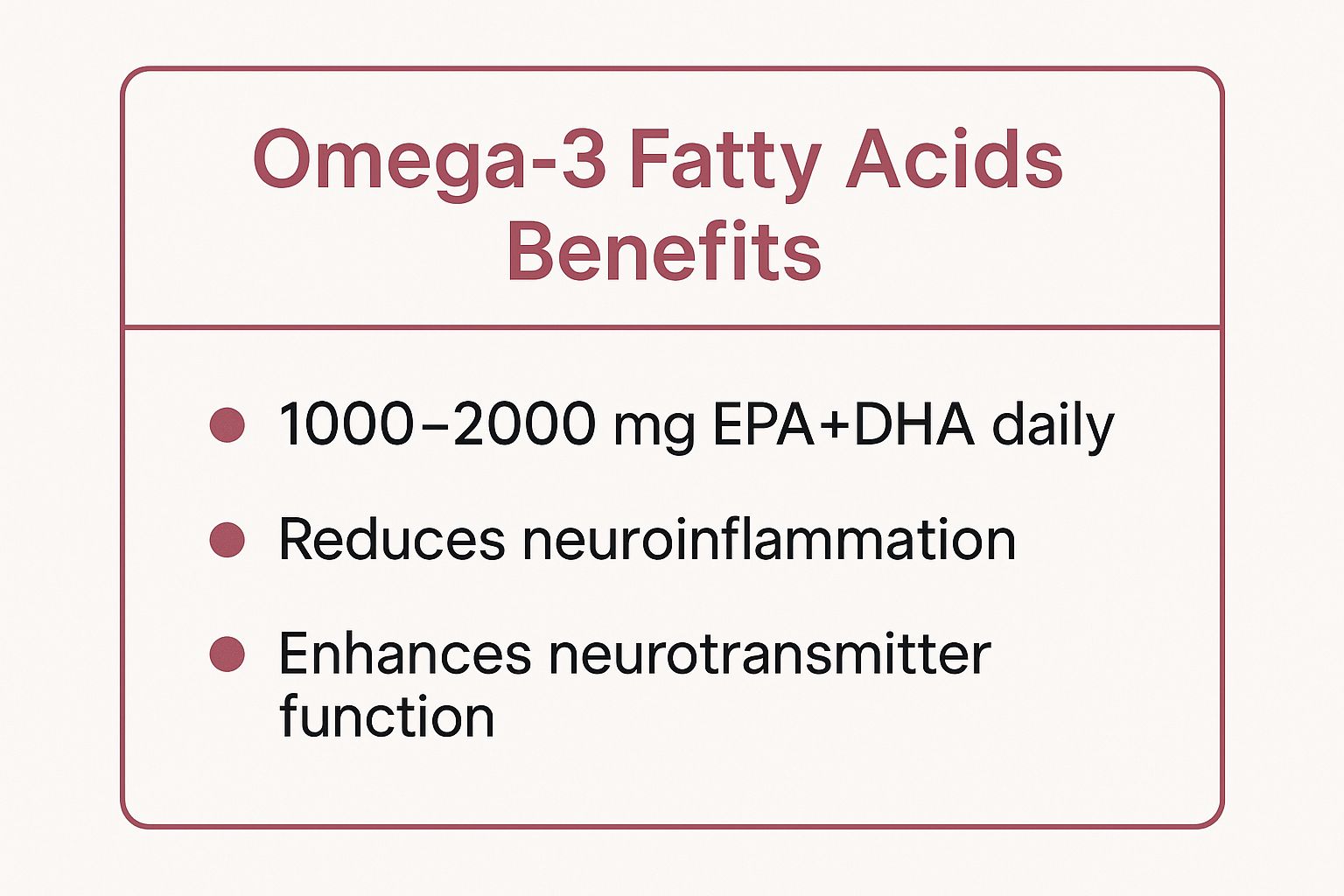
These core benefits highlight how a daily, targeted dose of omega-3s directly combats neuroinflammation and supports the foundational mechanics of clear thinking.
2. Harness Neurogenesis with Lion's Mane Mushroom
Among the powerful natural remedies for brain fog, Lion's Mane mushroom (Hericium erinaceus) stands out for its unique ability to support the brain's own regenerative processes. This medicinal mushroom contains special bioactive compounds, known as hericenones and erinacines, which can cross the blood-brain barrier. Their primary function is to stimulate the production of Nerve Growth Factor (NGF), a protein essential for the survival, maintenance, and growth of neurons.
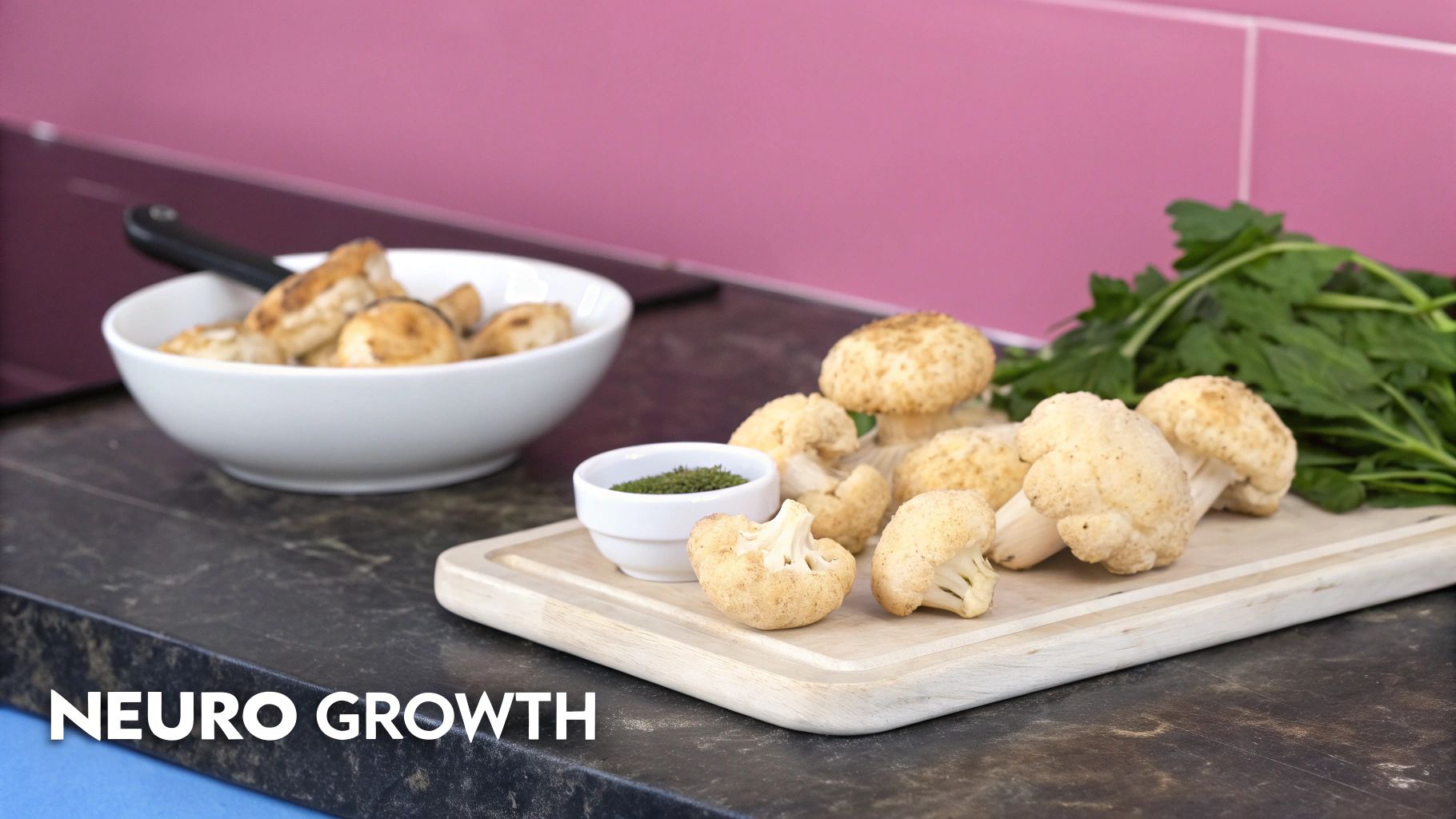
By promoting NGF, Lion's Mane encourages neurogenesis, the creation of new brain cells, and enhances neuroplasticity, the brain's ability to reorganise itself. This process directly counters the sluggish neural communication that characterises brain fog, helping to forge stronger, more efficient pathways for clearer thinking, improved memory recall, and heightened focus. It works by rebuilding the very infrastructure your cognition relies on.
Why Lion's Mane Is a Top-Tier Remedy
The cognitive benefits of Lion's Mane are not just rooted in traditional use in Chinese medicine; modern science is catching up. A landmark Japanese study involving elderly participants with mild cognitive impairment showed that those who took Lion's Mane for 16 weeks had significantly improved cognitive scores compared to a placebo group. Its growing popularity among biohackers and wellness experts is a testament to its effectiveness. Learn more about the mushroom that could boost your brain, mood, and immune system on myoji.co.uk.
Expert Insight: Renowned mycologist Paul Stamets has been a vocal advocate for Lion's Mane, often referring to it as "the smart mushroom." He champions its potential for neuroregeneration and its role in supporting cognitive function and preventing age-related decline.
Practical Steps for Implementation
To effectively integrate Lion's Mane into your wellness routine, consistency and quality are key. Unlike a stimulant, its effects are cumulative and build over time as it supports neural health.
- Target Dosage: Start with 500–1000 mg of a standardised extract daily. This ensures you receive a concentrated dose of its active compounds.
- Be Patient and Consistent: Take it every day for at least 4–6 weeks to properly assess its impact on your mental clarity and focus.
- Check for Quality: Look for supplements that specify their beta-glucan content, aiming for products with at least 30% beta-glucans, as this is a key marker of a potent mushroom extract.
- Culinary Use: Don't forget that Lion's Mane is also a delicious culinary mushroom. When cooked, it has a seafood-like texture and can be a fantastic, brain-healthy addition to your meals.
3. Harness Cognitive Clarity with Bacopa Monnieri
Delving into the ancient traditions of Ayurvedic medicine reveals potent natural remedies for brain fog, and Bacopa monnieri, often called Brahmi, stands out as a revered cognitive enhancer. This adaptogenic herb has been utilised for over 3,000 years to improve memory and intellect. Its power lies in active compounds known as bacosides, which work to sharpen mental clarity by supporting neurotransmitter function and protecting brain cells from damaging oxidative stress.
Bacopa works by improving the communication between neurons and balancing crucial neurotransmitters like acetylcholine, which is vital for memory and learning. It also enhances the body's antioxidant defences within the brain, helping to reduce the low-grade inflammation and cellular stress that often manifest as mental slowness and a lack of focus. By fortifying neural pathways, Bacopa helps create a more resilient and efficient cognitive environment, effectively cutting through the haze.
Why Bacopa Monnieri Is a Top-Tier Remedy
The efficacy of Bacopa monnieri is not merely a matter of tradition; it is increasingly validated by modern scientific research. For instance, multiple controlled studies have shown significant improvements in cognitive performance. A notable 12-week study demonstrated that adults taking Bacopa experienced a 20-25% improvement in memory recall tasks compared to a placebo group. Another study found that medical students using the herb showed enhanced information processing speed and reduced anxiety during exams.
Expert Insight: Authoritative platforms like Examine.com, a leader in evidence-based nutritional analysis, have compiled extensive research highlighting Bacopa's consistent and statistically significant benefits for memory formation, making it a reliable tool for anyone seeking to optimise cognitive function.
Practical Steps for Implementation
To effectively integrate Bacopa monnieri into your routine, consistency and proper dosage are key. The full cognitive benefits typically develop over several weeks as the active compounds accumulate and exert their effects.
- Target Dosage: Aim for 300–600 mg daily of a standardised extract containing at least 50% bacosides. This ensures you are receiving a therapeutic dose of the active compounds.
- Supplement Wisely: Bacopa is fat-soluble, so taking it with a meal that contains some fat will significantly enhance its absorption and effectiveness. This also helps minimise potential stomach upset.
- Be Patient: Unlike stimulants, Bacopa's effects are gradual. Commit to consistent use for at least 8–12 weeks to experience its full benefits on memory and mental clarity.
- Consider Cycling: Some practitioners recommend cycling the herb to maintain its efficacy. A common approach is to take it for 12 weeks, followed by a 2–4 week break.
4. Rhodiola Rosea
When brain fog stems from overwhelming stress and mental fatigue, turning to powerful adaptogenic herbs offers a targeted solution. Rhodiola rosea is a prime example of these natural remedies for brain fog. This resilient herb thrives in the harsh, cold climates of Arctic regions and has been used for centuries to enhance physical and mental endurance, helping the body adapt to and resist various stressors.
Rhodiola works by modulating the body's primary stress response system, specifically by balancing cortisol levels. Chronically elevated cortisol, often a result of sustained stress, is a major culprit behind cognitive issues like poor memory and lack of focus. By helping to regulate this hormone and supporting key neurotransmitters like dopamine and serotonin, rhodiola directly combats stress-induced mental exhaustion, promoting clarity and boosting mental energy.
Why Rhodiola Is a Top-Tier Remedy
The efficacy of rhodiola is well-documented, particularly for improving cognitive function under stressful conditions. Historically, it was used by Russian cosmonauts and athletes to enhance performance and fight fatigue. Modern research corroborates this, with studies demonstrating significant improvements in mental performance, concentration, and mood in individuals facing stressful periods, such as students during exam seasons. Its long-standing use in Scandinavian countries for managing seasonal affective disorder further highlights its mood-supportive benefits.
Expert Insight: Prominent herbalists and integrative health practitioners frequently recommend rhodiola for its unique dual-action properties. It simultaneously calms the stress response while providing a non-jittery energy boost, making it ideal for those who feel both "wired and tired."
Practical Steps for Implementation
To effectively integrate rhodiola into your wellness routine, precise dosage and timing are key to maximising its benefits without disrupting your natural rhythms.
- Target Dosage: Aim for 200–400 mg daily. It is crucial to look for supplements standardised to contain at least 3% rosavins and 1% salidroside, which are the active compounds responsible for its effects.
- Best Time to Take: Consume your dose in the morning on an empty stomach, about 15–30 minutes before breakfast. This enhances absorption and aligns with your body's natural energy cycle.
- Start Low and Go Slow: Begin with a smaller dose, such as 100–200 mg, to assess your individual tolerance before increasing to the full recommended amount.
- Avoid Evening Doses: Due to its energising properties, avoid taking rhodiola after 2 PM to prevent potential interference with sleep patterns.
5. Sharpen Your Mind with Ginkgo Biloba
As one of the oldest living tree species on Earth, Ginkgo biloba offers a time-tested solution for those seeking natural remedies for brain fog. For thousands of years, its distinctive fan-shaped leaves have been utilised in traditional medicine, particularly for enhancing cognitive clarity. The power of ginkgo lies in its unique compounds, namely flavonoids and terpenoids, which work synergistically to improve brain function.
These active components are known to enhance blood circulation throughout the body, including crucial micro-circulation within the brain. Improved blood flow means better delivery of oxygen and nutrients to brain cells, which is fundamental for optimal cognitive processing. Furthermore, ginkgo acts as a powerful antioxidant, protecting delicate brain tissue from the oxidative stress that can contribute to mental fatigue and a lack of focus.
Why Ginkgo Biloba Is a Top-Tier Remedy
The reputation of Ginkgo biloba is not merely anecdotal; it is one of the most well-researched herbal supplements for cognitive health. In countries like Germany, standardised ginkgo extract is widely prescribed by doctors to support memory and concentration. Numerous studies, while showing modest effects, consistently point towards improvements in attention, processing speed, and memory in adults taking the supplement. Its long history in Traditional Chinese Medicine for circulatory support further validates its role in promoting a clear and active mind.
Expert Insight: European phytomedicine research, heavily influenced by companies like Schwabe Pharmaceuticals, has extensively documented Ginkgo biloba's neuroprotective and circulatory benefits. This body of research establishes it as a credible and effective tool for combating cognitive decline and mental slowness.
Practical Steps for Implementation
To effectively integrate Ginkgo biloba into your wellness routine, consistency and proper dosage are key. The goal is to use a standardised extract to ensure you receive a reliable concentration of its active compounds.
- Target Dosage: Aim for 120–240 mg of a standardised extract daily. Look for products containing 24% flavonoid glycosides and 6% terpene lactones.
- Divide Your Dose: To maintain stable levels in your system and minimise potential stomach upset, divide the total daily amount into two or three smaller doses taken with meals.
- Be Patient: The benefits of Ginkgo biloba are cumulative. You should allow at least four to six weeks of consistent use to accurately assess its full impact on your brain fog.
- Supplement Sourcing: Choose a reputable brand, such as Nature's Way or another that provides third-party testing, to guarantee the quality and potency of the extract.
6. Magnesium Supplementation
When considering foundational natural remedies for brain fog, magnesium often emerges as a critical, yet frequently overlooked, mineral. It's a powerhouse cofactor involved in over 300 enzymatic reactions in the body, many of which are essential for optimal brain function, energy production, and nerve transmission. A deficiency in this key mineral can directly manifest as mental fatigue, poor concentration, and the pervasive feeling of brain fog.
Magnesium plays a vital role in maintaining the health of your brain cells' energy factories, the mitochondria, and helps regulate neurotransmitters like glutamate and GABA, which are crucial for learning, memory, and calmness. By ensuring adequate magnesium levels, you are directly supporting the physiological processes that underpin mental clarity and a stable mood, making it an indispensable tool for clearing the cognitive haze.
Why Magnesium Is a Top-Tier Remedy
The link between magnesium and cognitive function is well-established. It’s estimated that a significant portion of the adult population, perhaps as high as 75%, does not meet the recommended daily intake of magnesium, creating a widespread vulnerability to its deficiency symptoms. This mineral is particularly effective because it supports the brain’s plasticity, the ability to form new neural connections, and helps protect it from the over-excitation of neurons that can lead to mental burnout.
Expert Insight: Figures like Dr. Carolyn Dean, a leading medical doctor and naturopath, have extensively written about the "magnesium miracle," highlighting its profound impact on everything from migraines and anxiety to chronic fatigue and brain fog. Her work emphasises that correcting a simple mineral deficiency can yield powerful results.
Practical Steps for Implementation
Incorporating more magnesium into your routine is a straightforward strategy with significant cognitive payoffs. The key is to focus on both dietary intake and highly absorbable forms of supplementation.
- Target Dosage: Aim for 200–400 mg of supplemental magnesium daily. This is a general guideline; individual needs may vary.
- Best Forms for Absorption: Not all magnesium supplements are created equal. Choose highly bioavailable forms like magnesium glycinate, citrate, or threonate. Magnesium threonate is particularly noted for its ability to cross the blood-brain barrier.
- Timing is Key: Taking your magnesium supplement with your evening meal or before bed can improve its absorption and may promote a more restful sleep, which further helps in combating brain fog.
- Increase Dietary Sources: Boost your intake of magnesium-rich foods such as leafy greens (spinach, kale), nuts (almonds, cashews), seeds (pumpkin, chia), and legumes.
Magnesium is just one of several crucial minerals the brain needs to function at its best. To understand its role in a broader context, you can explore the benefits of trace minerals and see how they work together to support overall cognitive health.
7. Energise Your Mind with B-Complex Vitamins
When considering natural remedies for brain fog, it's essential to look at the very fuel your brain runs on. B-complex vitamins are a group of eight water-soluble vitamins that act as the spark plugs for your cellular energy production. They are indispensable for converting the food you eat into usable energy and for synthesising neurotransmitters like dopamine and serotonin, which govern mood, focus, and mental clarity.
These vitamins work together in a finely tuned symphony to support neurological function. A deficiency in even one of them, particularly B12, B6, or B9 (folate), can disrupt this delicate balance, leading directly to symptoms of brain fog, chronic fatigue, and poor concentration. By ensuring your body has an adequate supply, you are providing the critical cofactors needed for sharp cognitive processing and sustained mental energy.
Why B-Vitamins Are a Foundational Remedy
The link between B-vitamin status and cognitive function is well-established. For example, certain populations are at a higher risk of deficiency and the resulting mental haze. Older adults often struggle with absorbing vitamin B12, while vegetarians and vegans can easily become deficient as B12 is primarily found in animal products. Furthermore, chronic stress is known to rapidly deplete the body's B-vitamin stores, making replenishment crucial for maintaining cognitive resilience.
Expert Insight: Practitioners of orthomolecular medicine have long emphasised the importance of optimal B-vitamin levels for mental health. Prominent supplement brands like Jarrow Formulas and Country Life have built their reputations on providing high-quality, bioavailable B-complex formulas specifically to address the neurological impacts of these common deficiencies.
Practical Steps for Implementation
Integrating a potent B-complex into your daily regimen can be one of the most effective strategies for lifting the mental fog. The key is consistency and choosing a high-quality, easily absorbable form.
- Optimal Timing: Take your B-complex supplement in the morning with food. This timing supports your body's natural energy cycle, and taking it with a meal enhances absorption and minimises any potential stomach upset.
- Look for Bioavailable Forms: Opt for supplements containing the methylated or 'active' forms of these vitamins, such as methylcobalamin (B12) and methylfolate (B9). These are more easily utilised by the body, especially for those with common genetic variations that impair vitamin conversion.
- Increase Intake During Stress: Consider a higher-potency formula during periods of intense physical or mental stress to counteract the accelerated depletion of these crucial nutrients.
- Incorporate B-Rich Foods: Boost your dietary intake with foods like nutritional yeast (a B-vitamin powerhouse), leafy greens, legumes, eggs, and lean meats to create a strong nutritional foundation.
8. Quality Sleep Optimisation
Addressing the root causes of brain fog often leads to one of the most powerful, yet frequently neglected, natural remedies: sleep. Sleep is not a passive state; it is your brain's dedicated maintenance cycle. During deep sleep, a remarkable process called the glymphatic system actively flushes out metabolic waste and neurotoxins that accumulate during waking hours. This nightly detoxification is essential for restoring neural pathways, consolidating memories, and ensuring your brain is primed for optimal performance the next day.
A lack of quality sleep directly sabotages this process, leaving behind a residue of cellular debris that contributes significantly to the feeling of mental haze, poor focus, and slow thinking. Prioritising sleep optimisation is therefore one of the most effective strategies for clearing brain fog and reclaiming mental clarity.

Why Sleep Is a Top-Tier Remedy
The connection between sleep deprivation and cognitive impairment is well-established and immediate. Studies consistently show that even a single night of poor sleep can impair attention, executive function, and working memory. The chronic brain fog experienced by shift workers and individuals with conditions like sleep apnoea provides compelling real-world evidence. When these underlying sleep issues are treated, patients often report a dramatic and rapid improvement in mental sharpness.
Expert Insight: Leading neuroscientists and sleep experts like Dr. Matthew Walker and Dr. Andrew Huberman have extensively popularised the concept that sleep is non-negotiable for brain health. They emphasise that sleep is the foundation upon which all other cognitive functions are built, making it a critical focus for anyone looking to resolve brain fog.
Practical Steps for Implementation
Improving your sleep hygiene doesn't require drastic measures but rather consistent, mindful habits. The goal is to create an environment and routine that signals to your body it's time for restorative rest. For a more comprehensive look at this topic, you can learn more about how to clear brain fog on Myoji.co.uk.
- Maintain a Consistent Schedule: Aim for 7–9 hours of sleep per night. Going to bed and waking up at the same time, even on weekends, helps regulate your body's internal clock, or circadian rhythm.
- Create a Sleep Sanctuary: Your bedroom should be cool, dark, and quiet. Blackout curtains, an eye mask, earplugs, or a white noise machine can make a significant difference.
- Establish a Wind-Down Routine: Avoid stimulating activities and screens (phones, tablets, TVs) for at least 1-2 hours before bedtime. The blue light emitted from these devices can suppress melatonin production, the hormone that governs sleep.
- Consider Natural Sleep Aids: If you struggle to unwind, consider sipping on chamomile tea or supplementing with magnesium glycinate, which can help calm the nervous system and improve sleep quality.
Natural Remedies Effectiveness Comparison
| Item | Implementation Complexity 🔄 | Resource Requirements ⚡ | Expected Outcomes 📊 | Ideal Use Cases 💡 | Key Advantages ⭐ |
|---|---|---|---|---|---|
| Omega-3 Fatty Acids | Moderate - daily supplementation, quality varies | Moderate - fish, supplements, or plant-based sources | Improved cognitive function, reduced inflammation | Brain health, reducing brain fog, cognitive decline | Scientifically proven, anti-inflammatory, multiple sources |
| Lion's Mane Mushroom | Moderate - consistent use for weeks | Low to moderate - supplements or fresh mushroom | Neurogenesis, memory/focus improvement (slow onset) | Cognitive enhancement, nerve repair, neuroregeneration | Stimulates nerve growth factor, well-tolerated |
| Bacopa Monnieri | Moderate-High - requires weeks/months use | Moderate - standardized extracts or herbal supplements | Memory, cognitive boost, stress reduction (slow onset) | Memory support, anxiety-related brain fog | Extensively researched, adaptogenic, antioxidant |
| Rhodiola Rosea | Low-Moderate - daily dosing, some timing needed | Low - standardized herbal extracts | Rapid stress relief, mental energy boost | Stress-induced brain fog, fatigue | Fast onset, improves mood and stress resilience |
| Ginkgo Biloba | Moderate - daily standardized extract dosing | Moderate - herbal extracts | Modest cognitive improvement, improved brain circulation | Age-related cognitive decline, circulation issues | Long research history, enhances blood flow |
| Magnesium Supplementation | Low - daily supplementation, absorption varies | Low - widely available supplements and diet options | Better concentration, reduced brain fog, improved sleep | Addressing magnesium deficiency-related brain fog | Addresses common deficiency, multiple health benefits |
| B-Complex Vitamins | Low - daily supplementation | Low - supplements, dietary intake | Rapid improvement in mental clarity and energy | Deficiency-related cognitive issues, chronic stress | Synergistic effect of vitamins, safe and widely available |
| Quality Sleep Optimization | High - lifestyle changes required | Low - environmental & behavioral adjustments | Comprehensive cognitive restoration, toxin clearance | Root cause for brain fog, general mental clarity | Addresses underlying causes, wide-ranging health benefits |
Your Action Plan for Lasting Mental Clarity
Navigating the landscape of natural remedies for brain fog can feel overwhelming, but the path to a sharper, more focused mind is clearer than you might think. This article has equipped you with a powerful toolkit, moving beyond generic advice to provide specific, actionable strategies. We’ve explored how targeted nutrition, powerful adaptogens, and foundational lifestyle changes work synergistically to dispel the haze and restore your cognitive vitality.
The key takeaway is that combating brain fog is not about finding a single, miraculous cure. Instead, it’s about creating a personalised and consistent wellness architecture. Your brain, like any high-performance engine, requires a precise combination of fuel, maintenance, and stress management to function at its peak. The strategies we've discussed, from integrating Omega-3 rich foods to optimising your sleep hygiene, are the individual components of that high-performance system.
Weaving Your Personalised Cognitive Toolkit
Think of the remedies we've covered as different threads. By weaving them together, you create a strong, resilient fabric of mental clarity.
- Nutritional Foundation: Start with the building blocks. Prioritising B-Complex vitamins and Magnesium lays the groundwork for optimal neurotransmitter function and cellular energy. Making a conscious effort to include sources of Omega-3s, like oily fish or walnuts, directly supports brain structure and reduces inflammation.
- Adaptogenic Support: This is where you can truly fine-tune your response to stress, a primary driver of brain fog. Herbs like Lion’s Mane mushroom, Bacopa Monnieri, Rhodiola Rosea, and Ginkgo Biloba offer targeted support for memory, focus, and mental stamina. They help your body adapt to and resist the cognitive toll of modern life.
- Lifestyle Cornerstone: Never underestimate the profound impact of quality sleep. It is the non-negotiable reset button for your brain, during which it clears out metabolic waste and consolidates memories. All the supplements and superfoods in the world cannot compensate for chronic sleep deprivation.
Your journey should be one of gradual integration, not a frantic overhaul. The most effective approach is to select one or two strategies that resonate most with your current lifestyle and challenges. Perhaps you start by committing to a consistent sleep schedule and introducing a high-quality B-complex supplement. Once that becomes a habit, you might experiment with adding Lion's Mane to your morning routine or incorporating Rhodiola Rosea on particularly demanding days.
Key Insight: Consistency trumps intensity. A small, sustainable change practised daily will yield far greater results in clearing brain fog than a grand, short-lived effort. Monitor how you feel, listen to your body’s feedback, and adjust your approach accordingly.
Mastering these natural remedies for brain fog empowers you to reclaim control over your mental state. It's about moving from a reactive position, where you're simply enduring the fog, to a proactive one, where you are actively building a resilient mind. This journey enhances not just your professional productivity but also your presence and enjoyment in your personal life. When your mind is clear, you are more engaged, creative, and capable of tackling whatever challenges come your way. This is the ultimate benefit: a return to the sharp, vibrant, and focused version of yourself.
Ready to simplify your approach and give your brain a powerful, all-in-one foundation? Discover how the synergistic blend of adaptogens and over 85 essential minerals in Oji Shilajit can support your journey to lasting mental clarity. Visit Oji Shilajit to learn how our unique formulation can help you cut through the fog and unlock your cognitive potential.


